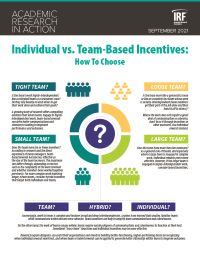IRF Study Examines When to Use Individual or Team-Based Incentives, or Both
A new report from the Incentive Research Foundation focuses on the use of teams and incentives in business and cites research to help identify the best strategy for different situations.
 When to use individual or team-based incentives is the subject of a new report from the Incentive Research Foundation. The question has become especially relevant now that organizations are grappling with how to manage collaboration in the new work-from-home environment. Click here for the full report.
When to use individual or team-based incentives is the subject of a new report from the Incentive Research Foundation. The question has become especially relevant now that organizations are grappling with how to manage collaboration in the new work-from-home environment. Click here for the full report.
Here are some of the key findings, based on a meta-analysis of multiple academic studies.
• Over the past two decades, teams have become increasingly important in work. Today, teamwork and collaboration consume about 80% of the typical knowledge worker’s day, the report finds.
• Though most employees agree that team-based work is essential, only one-quarter prefer to work in teams versus alone.
• For incentives to do good rather than harm, they should encourage the types of actions and behaviors appropriate to the work of the team in question – the right incentives at the right time. Leaders and reward program designers should first determine whether the work of the team is highly interdependent (a tight team) versus loosely dependent (loose team).
• Leaders may favor incentives and rewards aimed at individual effort and outcomes because they are comparatively easier to measure and administer. Yet individual rewards might contribute very little to team dynamics and performance, or even detract from them. For example, the crucial hubs in high-performing teams – people who sacrifice personal achievement to assist team members – will rarely qualify for individual rewards. Organizations that overlook and/or discourage these crucial connectors (“sacrificers”) might pay a steep price.
• Team-based incentives and rewards may prove more difficult to administer (particularly in larger teams) because individuals come to their teams with different goals and contribute varying levels of effort and/or value. Team rewards may even introduce issues of “free-riding,” where individuals let their teammates do most of the work while sharing equally in the reward.
• The study finds that a significant body of research questions the very efficacy of team-based incentives. For example, in a 2010 meta-review published in the Journal of Business Research, the authors conclude: “Despite hundreds of studies examining team rewards, the conditions under which team rewards will be effective are unclear” These factors may combine to make leaders reluctant to consider team-based incentives and may also discourage their advisors (reward program designers and consultants) from recommending them.
• The report also finds a growing body of research, however, offering compelling evidence that where small teams engage in highly interdependent work, team-based rewards drive better performance and outcomes than individual rewards. This effect may be heightened in the presence of intergroup competition – where small, interdependent teams compete with other small teams.
• Researchers have found that in small, highly-interdependent teams, hybrid rewards – which recognize team achievements and the behaviors and productivity of individual team members – can drive the best results of all. Other research, however, finds that team-based rewards alone prove most effective in the same circumstances.
• The research cited is consistent in finding that team-based and hybrid rewards are most effective where the work in small teams is “highly-interdependent.”
• In cases in which teams do not perform highly interdependent work, leaders should probably not use incentives (or other means) to encourage unnecessary communications and cohesion. Here, individual incentives are likely more effective.
Master the “S” of Environmental, Social, Governance (ESG), A.k.a. Stakeholder Capitalism
The Enterprise Engagement Alliance at TheEEA.org is the world’s first and only organization that focuses on outreach, certification and training, and advisory services to help organizations achieve their goals by fostering the proactive involvement of all stakeholders. This includes customers, employees, distribution and supply chain partners, and communities, or anyone connected to an organization’s success.
Training and Thought Leadership
- Founded in 2008, the Enterprise Engagement Alliance provides outreach, learning and certification in Enterprise Engagement, an implementation process for the “S” or Social of Stakeholder Capitalism and Human Capital Management and measurement of engagement across the organization.
- The Enterprise Engagement Alliance provides a training and certification program for business leaders, practitioners, and solution providers, as well as executive briefings and human capital gap analyses for senior leaders.
- The EEA produces an education program for CFOs for the CFO.University training program on Human Capital Management.
- Join the EEA to become a leader in the implementation of the “S” of ESG and Stakeholder Capitalism.
- The ESM information portal and The Enterprise Engagement Advisors Network solution provider marketplace cover all aspects of stakeholder engagement, and the EEA information library lists dozens of resources.
- The RRN information portal and Brand Media Coalition marketplace address the use of brands for gifting, incentives, recognition, and promotions. The BMC information library provides information and research resources.
Video Learning
The EEA Human Capital Management and ROI of Engagement YouTube channel features a growing library of 30- to 60-minute panel discussions with leading experts in all areas of engagement and total rewards.
- Enterprise Engagement for CEOs: The Little Blue Book for People-Centric Capitalists. A quick guide for CEOs.
- Enterprise Engagement: The Roadmap 5th Edition implementation guide. A comprehensive textbook for practitioners, academics, and students.
Enterprise Engagement Advisory Services
The Engagement Agency helps:
- Organizations of all types develop strategic Stakeholder Capitalism and Enterprise Engagement processes and human capital management and reporting strategies; conduct human capital gap analyses; design and implement strategic human capital management and reporting plans that address DEI (Diversity, Equity, and Inclusion), and assist with managed outsourcing of engagement products and services.
- Human resources, sales and marketing solution providers profit from the emerging discipline of human capital management and ROI of engagement through training and marketing services.
- Investors make sense of human capital reporting by public companies.
- Buyers and sellers of companies in the engagement space or business owners or buyers who seek to account for human capital in their mergers and acquistions.
For more information: Contact Bruce Bolger at Bolger@TheICEE.org or call 914-591-7600, ext. 230.
















